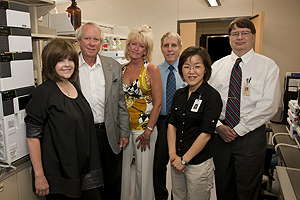Funding a Cure for Children

Kang believes the money from the CURE Cancer Foundation will advance knowledge on cancer therapy and the treatment of pediatric cancer.
The CURE Cancer Foundation recently awarded $25,000 to researcher Min Kang, Pharm.D., assistant professor in the Department of Cell Biology & Biochemistry. The funds will provide state-of-the-art equipment needed in pediatric cancer research. The gift also was matched with institutional funds.
The resources provided by the CURE Cancer Foundation will allow Kang and the School of Medicine Cancer Center to purchase a new High Performance Liquid Chromatography system. This will be mainly utilized to analyze patient samples from clinical trials measuring drug concentrations in their bodies.
Kang’s research seeks new treatments to potentially improve survival of pediatric cancer patients. Using various cell cultures and mouse models, researchers identify mechanisms of drugs and markers that could distinguish patients who will respond to the drug treatment.
In addition, the laboratory is also a resource for the Children’s Oncology Group (COG) and measures drug levels in the blood of 13-cis-retinoic acid for the majority of children in the United States that have a cancer called neuroblastoma. Most neuroblastoma patients are involved in COG studies for which Kang’s lab provides pharmacology data.
“These studies are important to advance knowledge about how to treat children with cancer and about cancer therapy in general,” Kang said. “Gifts such as these from the CURE Cancer Foundation are invaluable to my research and to my collaborators in the COG, and the children who depend on us to have a state-of-the-art instrument, with which to do these studies.”
The CURE Cancer Foundation’s primary mission is to fund translational cancer research.
Translational cancer research is a process where physicians and scientists take promising cancer test tube results from the science lab to the patients. When the test tube results reach patients, it is called a clinical trial. Clinical trials normally must be approved by both the National Cancer Institute (NCI) and the Food and Drug Administration prior to cancer patients receiving promising medicine.
Most clinical trials are conducted by approved NCI designated researchers at major cancer centers.
Don Curry, CURE Cancer Foundation director, said research dollars such as these are needed because the U.S. Congress vastly underfunds the NCI, and funds for promising cancer research are quickly depleted well before half way into the fiscal year.
“Researchers often have teams that apply for grants; however, funding is needed from as many sources as possible,” Curry said. “The CURE Cancer Foundation seeks to be one additional source for unfunded clinical trials.”
Curry added that most cancer organizations do not fund translational cancer research and clinical trials.
“The vast majority of funding goes to lessen the cancer burden of those suffering from the disease,” Curry said. “CURE Cancer Foundation is the bridge between the initial research and an actual cure.”
Related Stories
Celebrating Veterans: TTUHSC’s General Martin Clay’s Legacy of Service and Leadership
From his initial enlistment in the Army National Guard 36 years ago to his leadership in military and civilian health care management roles, Major General Martin Clay’s career has been shaped by adaptability, mission focus and service to others.
Texas Tech University Health Sciences Center School of Nursing Named Best Accelerated Bachelor of Science in Nursing Program in Texas
The TTUHSC School of Nursing Accelerated Bachelor of Science in Nursing (BSN) program has been ranked the No. 1 accelerated nursing program in Texas by RegisteredNursing.org.
TTUHSC Names New Regional Dean for the School of Nursing
Louise Rice, DNP, RN, has been named regional dean of the TTUHSC School of Nursing on the Amarillo campus.
Recent Stories
National Academy of Inventors Names TTUHSC Faculty Senior Members
The National Academy of Inventors (NAI) has designated two current and one former TTUHSC faculty researchers as Senior Members.
The John Wayne Cancer Foundation Surgical Oncology Fellowship Program at Texas Tech University Health Sciences Center Announced
TTUHSC is collaborating with the John Wayne Cancer Foundation and has established the Big Cure Endowment, which supports the university’s efforts to reduce cancer incidence and increase survivability of people in rural and underserved areas.
TTUHSC Receives $1 Million Gift from Amarillo National Bank to Expand and Enhance Pediatric Care in the Panhandle
TTUHSC School of Medicine leaders accepted a $1 million philanthropic gift from Amarillo National Bank on Tuesday (Feb. 10), marking a transformational investment in pediatric care for the Texas Panhandle.
